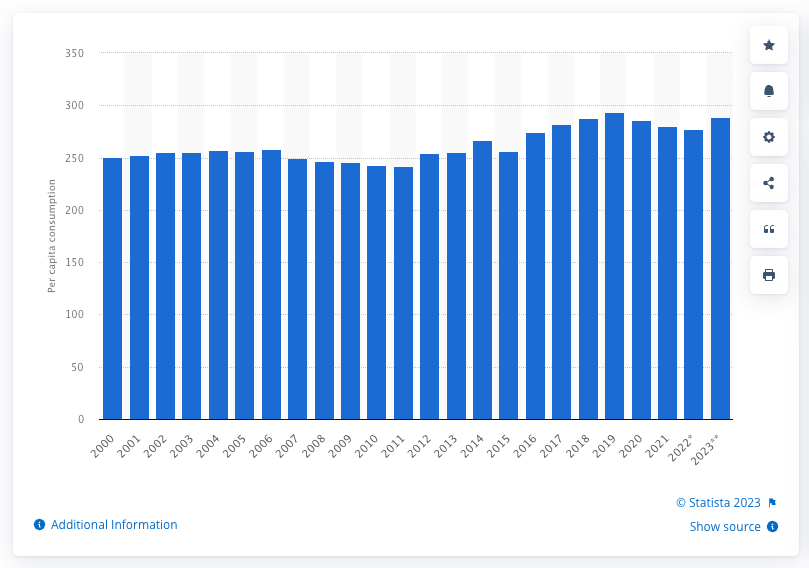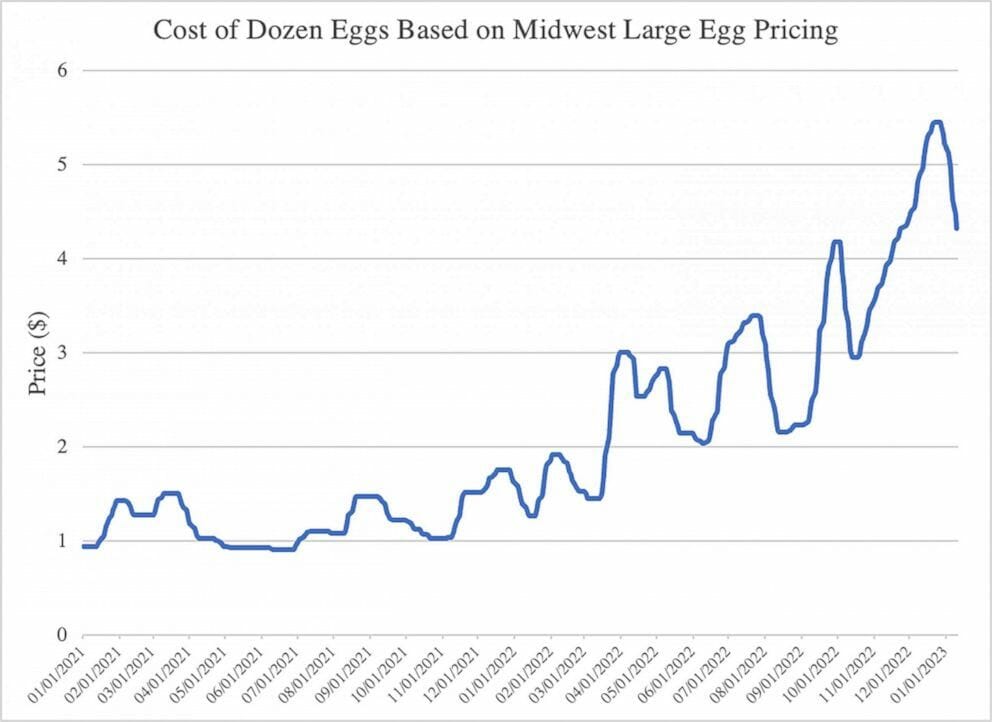Are you wondering how to save money on eggs? In the past 12 months, egg prices have shot through the roof! And we’re getting asked regularly by friends and media people, “Why are eggs so expensive and how can I get eggs for less?”
In Arizona, we’ve seen prices as high as $10 per dozen.
Are you wondering how you can still eat eggs without going broke? Or are you wanting to find ways to still have eggs in your weekly menu, but stretch them further? Or do you want to reduce the number of eggs in a variety of recipes and are looking for suitable egg substitutes?
We’ll share several ways to find eggs for less and several options for using fewer eggs when you are cooking. Also a bunch of ideas for eggless breakfasts and pancake mixes that don’t require added eggs.
Before we get into saving money on eggs, we’ll take a quick look at what has caused this recent spike in prices.
TABLE OF CONTENTS
Why Do Eggs Cost So Much Now?

In 2007 when about 1 percent of the laying chickens in the US died from Avian Flu prices rose about 60 percent. This time approximately 10 – 12 percent of chickens were lost. The rise in egg prices in 2022 and 23 was primarily due to a number of factors, including
- Avian Influenza Outbreaks: The United States experienced a significant outbreak of avian influenza in 2022, leading to the culling of more than 43 million chickens (10% to 12% of all egg layers) resulting in a shortage of eggs. (USDA Avian Flu Outbreak)
- Supply Chain Disruptions: The COVID-19 pandemic caused disruptions in the global supply chain, leading to increased demand for food and other essential items, including eggs. (Texas Standard)
- Increased Demand: The pandemic led to a shift in consumer behavior, with more people eating at home and looking for easy-to-prepare, high-protein foods like eggs. (see the chart below)
- Increased Costs of Production: The cost of production increased due to factors such as rising feed costs, labor costs, and transportation costs. (Texas A&M Today)
- Changes in Government Policies: Changes in government policies, such as tariffs and trade restrictions, also affected the price of eggs. (FDA.gov August 2022)
- Changes in local law: As of February 2023, 10 states have required that all chickens in their regions be raised without cages, affecting the caging practices of many egg farms. This change is causing a reduction in the number of chickens that can be kept per square foot, leading to decreased egg production. (TheHumanLeague.org)
These factors combined to cause a significant increase in egg prices in 2022 and 23. However, it’s worth noting that egg prices can also be influenced by other factors such as weather conditions, disease outbreaks, and market forces, and can vary depending on location and other circumstances.
Egg Consumption per capita in the U.S.
According to Statista.com, egg consumption has been on the rise in the United States in recent years.
In 2022, the average person in the United States was estimated to have consumed 277.5 eggs. It is projected that this figure will increase to 288.6 eggs per capita by 2023. Per capita consumption is calculated by dividing total egg production minus exports by the total U.S. population.

| Year | Number of Eggs Consumed per Person |
| 2015 | 256.3 |
| 2016 | 274.7 |
| 2017 | 281.8 |
| 2018 | 287.5 |
| 2019 | 293.4 |
| 2020 | 285.5 |
| 2021 | 282.5 |
| 2022 | 279 |
| 2023 | 281.3 |
How Much Do Eggs Cost Near You?
We either visited or contacted the following Phoenix, Arizona stores during the week of February 13, 2023, to compare the prices of one dozen eggs.
The bottom line of our research is that at any given time egg prices will fluctuate between different retailers – sometimes by as much as 40 to 60 percent.
2024 Prices
| Store | Cost for Eggs | Cost Per Egg |
| Frys Kroger | $3.99 Kroger Large White Dozen | $.333 per egg |
| Safeway/Albertsons | $5.49 Lucerne Eggs Large Dozen | $.46 per egg |
| Trader Joes | $4.99 Pasture Raised Large Brown Eggs Dozen | $.42 per egg |
| Whole Foods | $5.49 Organic Valley Organic Large Brown Dozen | $.46 per egg |
| Smart & Final | $3.99 First Street 1 Dozen | $.333 per egg |
| Natural Grocers | $5.99 Regenerative Organic Dozen | $.50 per egg |
| Costco | $5.83 for 24 Count Kirkland | $.242 per egg |
| Sams Club | $4.68 Members Mark 24 count | $.195 per egg |
2023 Prices
| Store | Cost for Eggs | Cost Per Egg |
| Frys Kroger | $7.99 Hickmans 1 Dozen$5.99 Happy Egg Free Range 1 Dozen | $.66 per egg $.49 per egg |
| Safeway/Albertsons | $4.89 Lucerne1 Dozen | $.41 per egg |
| Trader Joes | $4.99 Pasture Raised Large Brown Eggs 1 Dozen | $.42 per egg |
| Whole Foods | $5.79 Organic ValleyOrganic Large Brown 1 Dozen | $.48 per egg |
| Smart & Final | $5.99 First Street 1 Dozen | $.49 per egg |
| Natural Grocers | Nellies Free Range: $9.99Open Nature Eggs Cage Free $5.99 | $.83 per egg $.49 per egg |
| Costco | $7.45 for 24 Count Kirkland | $.31 per egg |
| Sams Club | $5.58 Egglans Best 18 count | $.31 per egg |
The Wholesale Cost of 1 Dozen Eggs Since 2021

This chart shows wholesale costs for 1 dozen eggs from January 2021 through January 2023. Data and chart obtained from Federal Reserve Economic Data and USDA.
How Much Do 2 Eggs Cost For Breakfast?
For the purpose of understanding how the price of eggs could affect your breakfast budget, we’ve created this easy comparison table. What do 2 Eggs for breakfast cost when egg prices increase?
| Cost Per Dozen | Cost per Egg | Cost for 2 Eggs for Breakfast |
| $.99 | $.08 | $.17 |
| $1.49 | $.12 | $.25 |
| $1.99 | $.17 | $.33 |
| $2.99 | $.25 | $.50 |
| $3.99 | $.33 | $.67 |
| $4.99 | $.42 | $.83 |
| $5.99 | $.58 | $1.17 |
| $7.99 | $.67 | $1.33 |
As you can see a 2 egg breakfast isn’t too expensive … unless you’re feeding a large family.
When all five of our kids were at home we would make a batch of scrambled eggs with cooked potatoes and onions using a dozen eggs each Sunday morning. The price for that meal today could be 8 times higher than when we would buy eggs for $.99 per dozen.
Keep reading for several ways you can save money buying eggs.
12 Ways to Buy Eggs Cheaper
There are lots of ways to save money on eggs and find the best deals. We’ll give you some common tips and a few that you may have never considered.
1. Comparison Shop
Compare the prices of eggs at different grocery stores. When you find a deal quietly share it with a few select friends, and ask them to share any deals they find with you.
A few weeks ago, we found that Natural Grocers had lower prices than our Safeway or Kroger stores. While Safeway and Kroger were charging $4 or $5 per dozen, Natural Grocery was selling them for between $2 and $3.99 (limit of 2). We told a few friends about this deal.
Another week when we compared, Sam’s Club and Costco had the lowest prices.
If you are doing a lot of baking or need a large number of eggs for a particular week, researching multiple stores to find the best price could be very beneficial. If you’re only buying one dozen eggs, then doing this much research won’t be worth your time.
2. Buy Store Brands
When you’re standing in the dairy department, compare all brands of eggs. You may find savings or unadvertised sales with store brands or you may find that the more expensive brands are actually cheaper.
3. Ask for Grade B Medium Eggs
Ask the dairy manager about how they deal with broken eggs. In the past, Kroger stores sold repackaged unbroken eggs as Grade B Eggs, which were cheaper.
We spoke with Kroger Corporate and they said that the Grade B egg program was no longer a corporate policy. They added that we should check with the local store’s dairy manager and ask how they deal with eggs from broken dozens.
Read our article on Grade B Eggs to learn more.
4. Weigh Your Eggs
The United States Department of Agriculture (USDA) has set minimum weights for Jumbo, Extra Large, Large and Medium eggs. Egg producers much ensure that the weight of the eggs in a package meets the minimum for that particular size.
Weigh a dozen eggs and see if the smaller, less expensive size that weighs more than the minimum weight set by the USDA would meet your need.
USDA 1 DOZEN EGGS WEIGHT MINIMUM
| Egg Size | USDA Minimum weight for 1 Dozen |
| Jumbo | 30 Ounces |
| Extra Large | 27 Ounces |
| Large | 24 Ounces |
| Medium | 21 Ounces |
Read the next tip to learn when you may get a better deal with smaller eggs.
5. Seasonal Savings with Medium Eggs
At Easter, Thanksgiving, and Christmas medium-sized eggs may weigh as much as large or extra-large eggs.
Many years ago we spoke with Clint Hickman – the owner of Hickman’s eggs in Arizona. As an egg farmer, he said, “A hen starts laying eggs at about 20 weeks of age and can lay for two to three years.
Medium-sized eggs come from young chickens; large and extra-large eggs from older hens.”
Hickman’s family tries to have the majority of their hens mature around the largest egg-consumption holidays (times when people do lots of baking): Easter, Thanksgiving, and Christmas.
At those times, with most of their chickens laying large or extra large eggs, they sometimes run short of medium eggs.
Egg producers can exceed the USDA weights, so they often will substitute large eggs in medium cartons. Savvy consumers should check the size and weight of medium eggs to get more for their money at those times of the year.
6. Look for Sales & Coupons
With egg prices extremely high right now, sales are few and far between. The best thing you can do is to stock up when you find a good price. Remember eggs in the U.S. can last about 35 days in the refrigerator. Read more about how long unrefrigerated and refrigerated eggs can last here.
7. Community-Supported Agriculture Groups
Join a community-supported agriculture (CSA) program: CSAs often offer fresh eggs from local farmers at a discounted price. Do a Google search for “Community Supported Agriculture groups Near Me.“
8. Farmer’s Markets
Some shoppers have found that egg prices at farmer’s markets are the same or less than current grocery store prices. You also may stumble on a deal a the end of the day when a vendor is closing up shop. Some sellers are known to discount the food they have left so they don’t have to cart it back home. We don’t know if this would apply to eggs, but it never hurts to ask.
9. Buy in Bulk to Save Money
Many grocery stores sell eggs in 24, 30, and 60 counts. Launch your calculator app and find out if the bulk eggs are less expensive per egg or per dozen than the 12 or 18-pack of eggs.
10. Stretch Your Egg Dishes
Get creative with ingredients: Use ingredients like spinach, mushrooms, diced potatoes, and cheese to add flavor and nutrition to your dishes without relying on eggs as the main ingredient. Or make a Strata with bread, veggies, cheese and some eggs. We have an amazing Strata recipe in our main dish recipes section. Give it a try.
11. Experiment with Egg-Free Recipes
There are many egg-free recipes available that can be used as an alternative to traditional egg-based recipes.
This article from BestofVegan.com gives a number of examples of recipes that normally contain eggs, but are cleverly egg-free.
12. Use other protein sources
Try using other protein sources like tofu, cheese, or beans in breakfast dishes. Keep reading to see a section of the article devoted to common Egg Substitutes.
13. Raise your own chickens
If you have the space, consider raising your own chickens for a fresh and consistent supply of eggs.
Our daughter Becky is now married with two children … and about 12 chickens. She’s selling some of her organic, free-range eggs for a little less than the more expensive grocery stores’ eggs.
If you can get eggs a little less expensive that will save some money, but if you can modify a recipe to use fewer eggs, you can save even more.
We go into more detail on raising chickens for eggs further on in this article.
Egg Substitutes: 10 Ways to Use Fewer Eggs in Recipes
Can you reduce the number of eggs in a recipe and still have it turn out well? Keep reading to learn about common products that you can substitute eggs with.
Use eggs sparingly in recipes
Instead of using multiple eggs in a recipe, try using just one or two. It will change the consistency, so try using one of the substitutes listed below. Don’t expect it to turn out perfectly the first time. But this chart should help you get close.
10 Common Egg Substitutes:
| Item | Quantity to Use | Egg Equivalent |
| Tofu | ¼ cup | 1 Egg |
| Yogurt | ¼ cup | 1 Egg |
| Pureed fruit | ¼ cup | 1 Egg |
| Peanut Butter | 3 tablespoons | 1 Egg |
| Ground Flax | 1 tablespoon mixed with 3 tablespoons of water | 1 Egg |
| Chia Seed | 1 tablespoon mixed with 3 tablespoons of water | 1 Egg |
| Soy Protein | 1 tablespoon mixed with 3 tablespoons of water | 1 Egg |
| Banana | ½ mashed banana | 1 Egg |
| Applesauce | ¼ cup | 1 Egg |
| Agar-Agar | 1 tablespoon mixed with 1 tablespoon of water | 1 Egg |
Many of these egg substitutes need to be stirred or whipped and then used immediately. Learn more from TheKitchenWhisperer
Other Non-Egg Breakfast Options
Try having oatmeal, yogurt with fresh fruit, cream of wheat, cream of rice, grits with cheese, cold cereal, smoothies, or toast for breakfast instead of egg-based dishes. This is a great time to introduce kids to other breakfast ideas. Prepping the night before and making sure that your kids leave the house with a full tummy will make their day go much better.
Oatmeal options:
Almond Joy Oatmeal is one of Annette’s favorite recipes. She takes a cup of cooked oatmeal and adds a tablespoon of shredded coconut and a tablespoon of chocolate chips. You could add a tablespoon of crushed almonds or walnuts to add more protein. It’s delicious.
Cinnamon Apple Walnut Oatmeal: Prep oatmeal as usual. Cut an apple into small pieces and add walnuts. Cook all ingredients together as you normally would cook plain oatmeal. For added flavor, sprinkle cinnamon to taste. This breakfast can be prepared individually in a bowl or in a larger batch in a pot.
Add Banana: Use ½ of a ripe banana and slice it thinly, then whisk it into the oats as they cook. It makes it taste wonderful and adds a bit of potassium to your diet, which can help to lower your blood pressure. For fun, you can add maple syrup or peanut butter.
Carrot Cake Oatmeal: Add shredded carrots and other spices. It may sound strange to eat carrots for breakfast, but this recipe is really amazing. Use 2 carrots and add in a pinch of brown sugar, ginger, cinnamon, and a dash of vanilla extract, You can also top with shredded coconut or walnuts for added crunch.
Pancakes with No Added Eggs

Buy a pancake mix that includes eggs in it and add some protein powder and milk to make it more nutritious.
- Betty Crocker Complete Pancake Mix
- Cracker Barrel Buttermilk Pancake Mix
- Krusteaz Pancake Mix Just Add Water
- Golden Malted Just Add Water Non-GMO Waffle & Pancake Mix
If you want an amazing homemade pancake recipe (that does require eggs) get Steve’s Made from Scratch Pancake recipe here.
Amazing Delicious Fruit Salad with Yogurt this is a family favorite recipe that we make several times each year. Get the recipe here.
Lots of delicious quick bread recipes – that don’t require many eggs.
- Cranberry/ Orange Quick Bread (requires 1 egg)
- Buttermilk Bran Muffins/ Quick Bread (requires 2 eggs)
- Gooey and Delicious Monkey Bread (no eggs required)
Saving Money By Raising Backyard Chickens.

Is it cheaper now to raise your own chickens than to buy eggs from the store? Our daughter Becky and husband Nolan have 16 backyard chickens. They have kept their costs relatively low.
The savings you may get from raising backyard chickens depends on a number of factors. These include
- Cost of Chicks: $3 to $7 each depending on the breed (Becky and Nolan have been given 7 laying hens for free). You should be able to find lots of roosters for free also.
- Cost of feed: Becky buys something called flock builder for $27 for 50 lbs and it lasts 3 weeks, feeding 16 chickens. She also supplements with wheat and barley with scraps.
- Equipment – cooler, watering system (pan), pine shavings for nest boxes cost about $13 and she refreshes it 3 times per year. ($50 to $100)
- Building a chicken coop $250 – $350 (possibly less if you have scrap wood or find materials for free)
- Attrition: some chickens may die prematurely (Becky has had 1 chick die, but has also butchered and eaten 3 other chickens)
- Medical Costs: Becky bought an antiseptic called Vetericyn Plus (3 oz for $18) to disinfect pecks and other open wounds. It has lasted 18 months. She spends less than $50 per year
Her 16 chickens produce 8 to 12 eggs per day (as of Feb 2023). But during the coldest time in the winter production was reduced to about 4 per day.
As you can see, raising your own chickens can often be less expensive in the long run, as you’ll have a steady supply of fresh eggs, and won’t have to pay the ongoing cost of purchasing eggs from the store. (see the video below for a cost breakdown)
Additionally, by raising your own chickens, you have control over the conditions in which they are raised, including their diet and living environment, which can have a significant impact on the cost and quality of the eggs.
It’s important to consider all the expenses involved, including the cost of building or buying a coop, fencing, feed, and any other supplies, as well as the time and effort required to care for the chickens, before deciding if raising your own chickens is a cost-effective option for you.
Two Experts Estimate the Cost of Raising Chickens
The experts at BackyardSidekick.com state that the cost of raising chickens for eggs is a little more than the cost of buying eggs from the store. For comparison, we did this calculation:
To understand the quote below, assume buying 1 dozen eggs each week for $5 per dozen. The annual cost would be $260.
“It costs between $150 to $300 per year to buy a dozen eggs per week from a grocery store and around $500 per year to raise chickens that will produce a dozen eggs per week.
The curious thing is that some people who raise chickens themselves are okay with paying the extra money. “
However, Jaime and Jeremy at Guildbrook Farm have different opinions on the cost of raising egg-laying chickens.
As homesteaders in the mountains of Appalachia, they break down the cost of raising backyard chickens in this video:
Conclusion about High Egg Prices

Dealing with high egg prices can be challenging, but there are several strategies that consumers can adopt to lessen the impact.
Realize that more expensive egg prices are not a permanent thing. Egg prices will drop as the effects of the Avian Flu dissipate and gas prices drop.
While high egg prices may be frustrating, by taking a proactive approach and exploring different options, consumers can still enjoy the benefits of eggs without breaking the bank.
By being creative and resourceful, it’s possible to make the most of any situation and find affordable and healthy ways to incorporate eggs into your diet.

